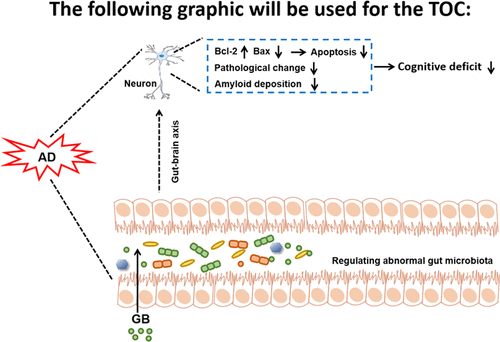当前位置:
X-MOL 学术
›
J. Agric. Food Chem.
›
论文详情
Our official English website, www.x-mol.net, welcomes your feedback! (Note: you will need to create a separate account there.)
Protective Effect of Ginkgolide B against Cognitive Impairment in Mice via Regulation of Gut Microbiota
Journal of Agricultural and Food Chemistry ( IF 6.1 ) Pub Date : 2021-10-11 , DOI: 10.1021/acs.jafc.1c05038 Jiaming Liu 1, 2 , Tao Ye 1 , Yuhe Zhang 2 , Rui Zhang 2 , Yu Kong 2 , Yang Zhang 3 , Jing Sun 1
Journal of Agricultural and Food Chemistry ( IF 6.1 ) Pub Date : 2021-10-11 , DOI: 10.1021/acs.jafc.1c05038 Jiaming Liu 1, 2 , Tao Ye 1 , Yuhe Zhang 2 , Rui Zhang 2 , Yu Kong 2 , Yang Zhang 3 , Jing Sun 1
Affiliation

|
Ginkgolide B (GB) is one of the main bioactive components of Ginkgo biloba leaf extracts with neuroprotective activity. However, the neuroprotective mechanism link between the anti-Alzheimer’s disease (AD) efficiency of GB and gut microbiota have remained elusive. Here, we elucidated the effect and possible mechanism of GB against cognitive impairment in mice. Male mice were induced with d-galactose and aluminum chloride to establish an AD animal model, and then intragastrically treated with GB. Cognitive function was assessed by an object recognition test and an open-field test. Amyloid deposition and neuropathological change were detected. The levels of receptor for advanced glycation end products (RAGE), Bcl-2, and Bax were detected. Moreover, microbial compositions were measured by 16s rRNA sequencing. Our results showed that GB significantly alleviated cognitive dysfunction, neurodegeneration, and neuropathological changes in AD model mice. Moreover, GB treatment remarkably reduced the levels of RAGE and Bax and increased the level of Bcl-2 in AD model mice. GB treatment reversed the decreased abundance of Lactobacillus and the increased abundance of Bacteroidales, Muribaculaceae, and Alloprevotella, which led to reconstruction of gut microbiota. These findings demonstrated the neuroprotective effects of GB in AD mice, which were partly mediated by modulating gut dysbiosis, indicating that GB might be a potentially active supplement to alleviate AD.
中文翻译:

银杏内酯 B 通过调节肠道菌群对小鼠认知障碍的保护作用
银杏内酯 B (GB) 是具有神经保护活性的银杏叶提取物的主要生物活性成分之一。然而,GB 的抗阿尔茨海默病 (AD) 效率与肠道微生物群之间的神经保护机制联系仍然难以捉摸。在这里,我们阐明了 GB 对小鼠认知障碍的作用和可能的机制。用d诱导雄性小鼠-半乳糖和氯化铝建立AD动物模型,然后用GB灌胃。通过物体识别测试和开放场测试评估认知功能。检测到淀粉样蛋白沉积和神经病理变化。检测了晚期糖基化终产物 (RAGE)、Bcl-2 和 Bax 受体的水平。此外,微生物组成是通过 16s rRNA 测序来测量的。我们的结果表明,GB 显着减轻了 AD 模型小鼠的认知功能障碍、神经变性和神经病理学变化。此外,GB 治疗显着降低了 AD 模型小鼠的 RAGE 和 Bax 水平,并增加了 Bcl-2 的水平。GB 处理逆转了乳酸杆菌丰度的减少和拟杆菌门丰度的增加、Muribaculaceae和Alloprevotella,导致肠道微生物群的重建。这些发现证明了 GB 对 AD 小鼠的神经保护作用,这部分是通过调节肠道生态失调介导的,表明 GB 可能是缓解 AD 的潜在活性补充剂。
更新日期:2021-10-20
中文翻译:

银杏内酯 B 通过调节肠道菌群对小鼠认知障碍的保护作用
银杏内酯 B (GB) 是具有神经保护活性的银杏叶提取物的主要生物活性成分之一。然而,GB 的抗阿尔茨海默病 (AD) 效率与肠道微生物群之间的神经保护机制联系仍然难以捉摸。在这里,我们阐明了 GB 对小鼠认知障碍的作用和可能的机制。用d诱导雄性小鼠-半乳糖和氯化铝建立AD动物模型,然后用GB灌胃。通过物体识别测试和开放场测试评估认知功能。检测到淀粉样蛋白沉积和神经病理变化。检测了晚期糖基化终产物 (RAGE)、Bcl-2 和 Bax 受体的水平。此外,微生物组成是通过 16s rRNA 测序来测量的。我们的结果表明,GB 显着减轻了 AD 模型小鼠的认知功能障碍、神经变性和神经病理学变化。此外,GB 治疗显着降低了 AD 模型小鼠的 RAGE 和 Bax 水平,并增加了 Bcl-2 的水平。GB 处理逆转了乳酸杆菌丰度的减少和拟杆菌门丰度的增加、Muribaculaceae和Alloprevotella,导致肠道微生物群的重建。这些发现证明了 GB 对 AD 小鼠的神经保护作用,这部分是通过调节肠道生态失调介导的,表明 GB 可能是缓解 AD 的潜在活性补充剂。



























 京公网安备 11010802027423号
京公网安备 11010802027423号